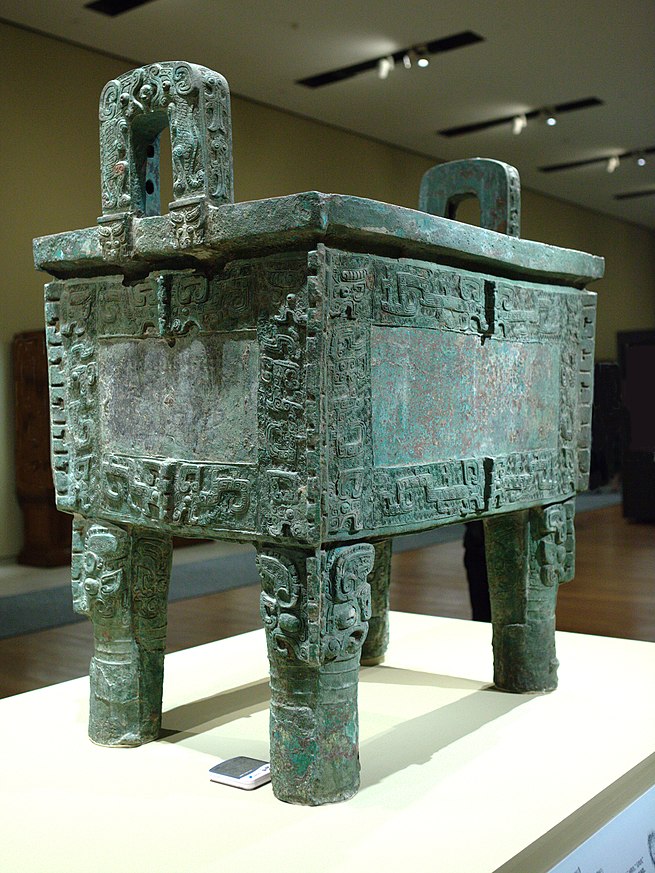
Main Difference
The main difference between Bronze and Brass is that the Bronze is a metal alloy and Brass is a alloy of copper and zinc.
-
Bronze
Bronze is an alloy consisting primarily of copper, commonly with about 12–12.5% tin and often with the addition of other metals (such as aluminium, manganese, nickel or zinc) and sometimes non-metals or metalloids such as arsenic, phosphorus or silicon. These additions produce a range of alloys that may be harder than copper alone, or have other useful properties, such as stiffness, ductility, or machinability.
The archeological period in which bronze was the hardest metal in widespread use is known as the Bronze Age. The beginning of the Bronze Age in India and western Eurasia is conventionally dated to the mid-4th millennium BC, and to the early 2nd millennium BC in China; everywhere it gradually spread across regions. The Bronze Age was followed by the Iron Age starting from about 1300 BC and reaching most of Eurasia by about 500 BC, although bronze continued to be much more widely used than it is in modern times.
Because historical pieces were often made of brasses (copper and zinc) and bronzes with different compositions, modern museum and scholarly descriptions of older objects increasingly use the more inclusive term “copper alloy” instead.
-
Brass
Brass is an alloy of copper and zinc, in proportions which can be varied to achieve varying mechanical and electrical properties. It is a substitutional alloy: atoms of the two constituents may replace each other within the same crystal structure.
In contrast, bronze is an alloy of copper and tin. Both bronze and brass may include small proportions of a range of other elements including arsenic, lead, phosphorus, aluminium, manganese, and silicon. The distinction is largely historical. Modern practice in museums and archaeology increasingly avoids both terms for historical objects in favour of the all-embracing “copper alloy”.Brass is used for decoration for its bright gold-like appearance; for applications where low friction is required such as locks, gears, bearings, doorknobs, ammunition casings and valves; for plumbing and electrical applications; and extensively in brass musical instruments such as horns and bells where a combination of high workability (historically with hand tools) and durability is desired. It is also used in zippers. Brass is often used in situations in which it is important that sparks not be struck, such as in fittings and tools used near flammable or explosive materials.
-
Bronze (noun)
A naturally occurring or man-made alloy of copper, usually in combination with tin, but also with one or more other metals.
-
Bronze (noun)
A reddish-brown colour, the colour of bronze.
“color panel|826644”
-
Bronze (noun)
A work of art made of bronze, especially a sculpture.
-
Bronze (noun)
A bronze medal.
-
Bronze (noun)
Boldness; impudence; brass.
-
Bronze (adjective)
Made of bronze metal.
-
Bronze (adjective)
Having a reddish-brown colour.
-
Bronze (adjective)
Tanned; darkened as a result of exposure to the sun.
-
Bronze (verb)
To plate with bronze.
“My mother bronzed my first pair of baby shoes.”
-
Bronze (verb)
To color bronze; (of the sun) to tan.
-
Bronze (verb)
To change to a bronze or tan colour due to exposure to the sun.
-
Bronze (verb)
To make hard or unfeeling; to brazen.
-
Brass (noun)
A metallic alloy of copper and zinc used in many industrial and plumbing applications.
-
Brass (noun)
A memorial or sepulchral tablet usually made of brass or latten
-
Brass (noun)
A class of wind instruments, usually made of metal (such as brass), that use vibrations of the player’s lips to produce sound.
-
Brass (noun)
Spent shell casings (usually made of brass); the part of the cartridge left over after bullets have been fired.
-
Brass (noun)
The colour of brass.
“color panel|C9AE5D”
-
Brass (noun)
High-ranking officers.
“The brass are not going to like this.”
“The brass is not going to like this.”
-
Brass (noun)
A brave or foolhardy attitude; impudence.
“You’ve got a lot of brass telling me to do that!”
-
Brass (noun)
Money.
-
Brass (noun)
Inferior composition.
-
Brass (noun)
Brass in pocket; money.
-
Brass (noun)
A brass nail; a prostitute.
-
Brass (adjective)
Made of brass, of or pertaining to brass.
-
Brass (adjective)
Of the colour of brass.
-
Brass (adjective)
Impertinent, bold: brazen.
-
Brass (adjective)
Bad, annoying; as wordplay applied especially to brass instruments.
-
Brass (adjective)
Of inferior composition.
-
Brass (adjective)
Brass monkey; cold.
-
Brass (verb)
to coat with brass
-
Bronze (noun)
a yellowish-brown alloy of copper with up to one-third tin
“the Minoans made large numbers of statuettes in ivory and bronze”
“a bronze statue”
-
Bronze (noun)
a sculpture or other object made of bronze
“on the black bookcase were three exquisite bronzes”
-
Bronze (noun)
short for bronze medal
-
Bronze (noun)
a yellowish-brown colour
“rich, gleaming shades of bronze”
-
Bronze (verb)
make (a person or part of the body) suntanned
“Alison was bronzed by outdoor life”
-
Bronze (verb)
give (something) a surface of bronze or something resembling bronze
“the doors were bronzed with sculpted reliefs”
